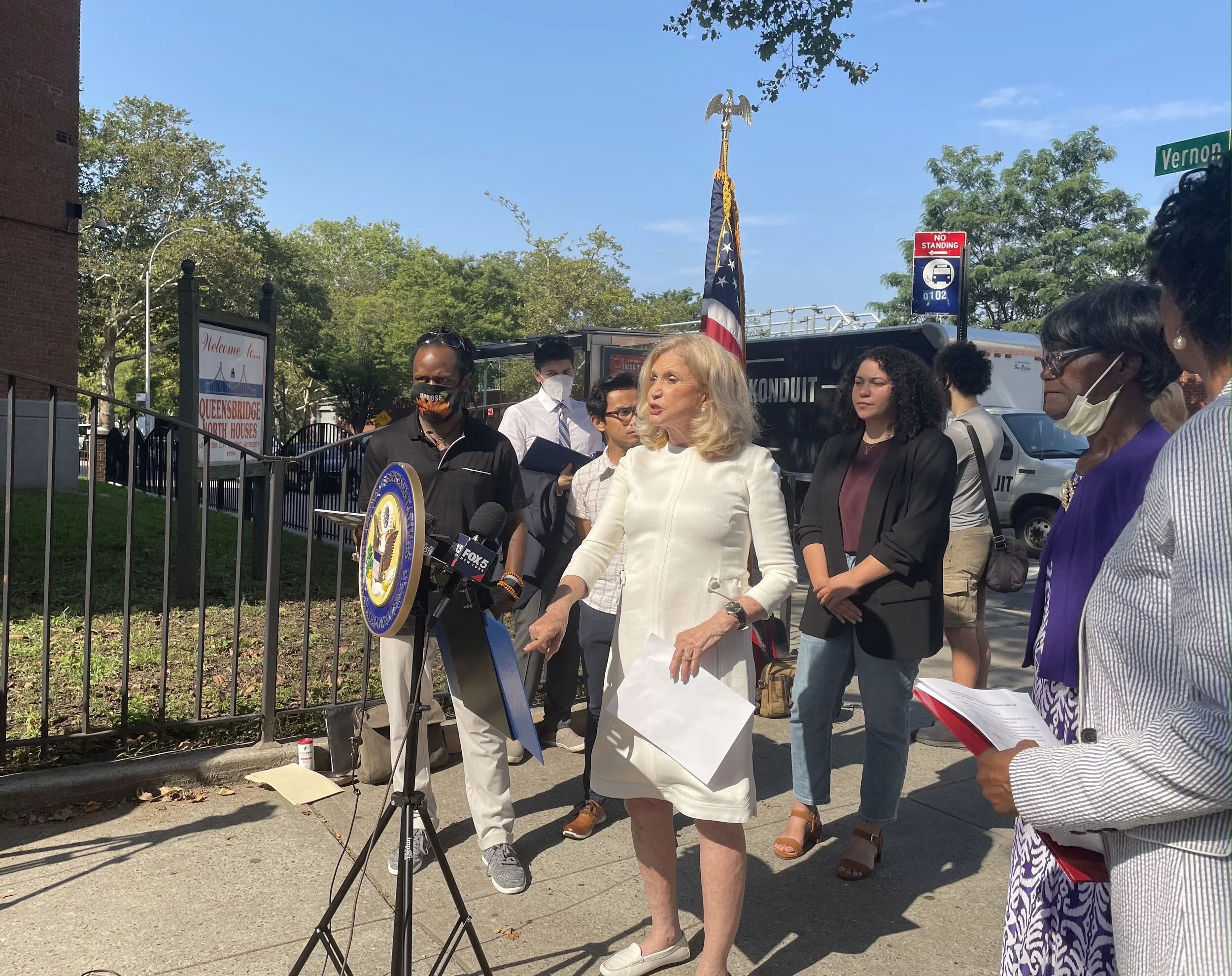Maloney joins fight against Queens power plant
/By Jacob Kaye
U.S. Rep. Carolyn Maloney spent the day speaking out against fossil fuel power plants that litter her congressional district and neighboring areas on Thursday.
The representative from District 12 called on the state to halt its plans to bring a new peaker plant – power stations that are used during times of high energy usage – to Astoria, signed onto new anti-peaker legislation, and chaired a U.S. House of Representatives Oversight Committee roundtable on the use of the plants throughout the country.
“We are here today because people in New York City and across our country are dying,” Maloney said. “Talk about environmental justice, there’s nothing more important.”
Early Thursday morning, Maloney was joined by Brooklyn Rep. Yvette Clarke, who, alongside Sen. Kirsten Gillibrand, has legislation that aims to put a stop to the construction of new peaker plants and to put some existing ones into retirement.
Maloney voiced her support for the The Promoting Energy Alternatives is Key to Emission Reductions Act, and called for the elimination of all peaker plants by 2030.
“I’ve had enough of power plants going up in our district,” she said.
The Queens portion of Maloney’s district is particularly saturated with the plants. There are five peakers in her district, all of which neighbor the Queensbridge, Ravenswood and Astoria Houses, which together make up the largest public housing community in the United States.
The area has been dubbed “Asthma Alley” for the disproportionate rates of asthma among its residents.
During the Oversight Committee’s roundtable discussion on the energy plants, Rep. Alexandria Ocasio-Cortez, who has spoken out against the planned NRG Peaker Plant in Astoria, said that it was time to dispel the myth that the country’s use of natural gas was a cheap alternative to green energy sources.
“We know that there is no such thing as cheap energy because the price of cheap energy has always been our lives, our health, our lungs, our cancer rates,” Ocasio-Cortez said. “Maybe it’s cheap for someone else in a mansion that gets to breathe clean air on a nice property but it is not cheap for the 1.2 million people in this city alone that live within striking distance of a peaker plant.”
Anthony Rogers-White, the director of environmental justice for the New York Lawyers for the Public Interest, spoke at the roundtable about the impact peaker plants and other pollutants have on Black and brown communities in Queens and beyond.
“I would have to say that peaker plants, which we are here today to talk about shutting down and replacing with renewable forms of energy, represent the epitome of environmental racism,” Rogers-White said. “What we do know is that Black, brown and indigenous people have been breathing in toxic air that has been generated disproportionately by affluent white people. We have to change that.”
Maloney is the latest elected official to voice opposition against the building of the NRG plant in Astoria. Mayor Bill de Blasio, Sen. Chuck Schumer, Ocasio-Cortez, State Sens. Jessica Ramos and Michael Gianaris, Assemblymember Zohran Mamdani and others have rallied several times in recent months – including on Thursday afternoon – against the project.
Opponents of the project, which aims to swap out outdated turbines with new and more efficient ones, say that the state should instead focus on building renewable energy sources and not ones that rely on fracked gas.
NRG says that the plant’s technology will allow it to “be converted to green hydrogen in the future” and is “fully consistent with the Climate Leadership and Community Prevention Act.”
“The need for reliable power is as great as ever,” said Dave Schrader, a spokesperson for NRG, who added that the project “will immediately result in significant reductions in greenhouse gas emissions and supports the expansion of renewable energy resources throughout the state.”
Public hearings on the project, hosted by the Department of Environmental Conservation, began earlier this week. The vast majority of speakers said they were against the building of the plant.
According to NRG, “hundreds of letters” of support were submitted in writing to the DEC ahead of the hearings.




